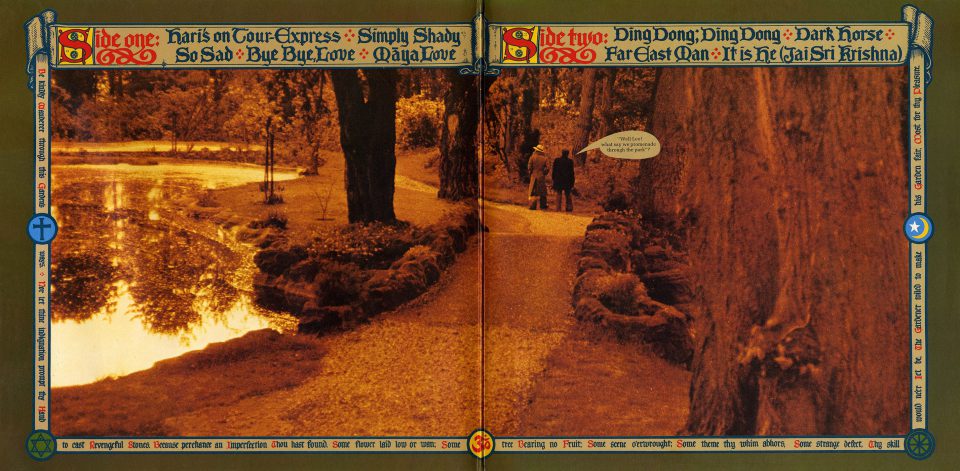Cover artwork
The cover artwork for Dark Horse was designed by Tom Wilkes, who had previously worked with Harrison on All Things Must Pass, The Concert For Bangladesh, and Living In The Material World.
The front showed an adapted photograph of Liverpool Institute teachers and pupils in 1956, assembled inside a lotus flower with the Himalayan mountains in the background, all overlooked by Shiv-Goraksha Babaji, regarded as a manifestation of Lord Shiva and the founder of the Nath tradition within Hinduism.
The thirteen-year-old Harrison is pictured top and centre of the students, his face tinted blue. The teachers wear a range of motifs including those for the Parlophone, Apple and Dark Horse labels. The art master, Stan Reid, whom Harrison liked, is pictured bearing the ॐ (Devanagari Om) symbol.
To take the GCE (General Certificate of Education) at 16, we had first to pass three subjects in the ‘mock’ GCE. The first result in the ‘mock’ was art, which I passed. But that’s because Stan Reid, the art teacher, was nice, you see (he’s the one with OM on his tee shirt on the Dark Horse album). Even though I wasn’t that good at art, I got enough to pass the exam. I thought: ‘Wow. Fantastic’.
I Me Mine
The gatefold shows Harrison and actor Peter Sellers walking beside a lake in the Friar Park grounds. A speech bubble coming from Sellers shows a line from the Mel Brooks film The Producers: “Well Leo! what say we promenade through the park?”
The image is surrounded by a border containing lines interspersed by Christian, Jewish and Hindu symbols:
Be kindly Wanderer through this Garden’s ways.
Nor let thine indignation prompt thy Hand to cast
Revengeful Stones.
Because perchance an Imperfection Thou hast found.
Some flower laid low or wan;
Some tree Bearing no Fruit;
Some scene o’erwrought;
Some theme thy whim abhors,
Some strange defect,
Thy skill would ne’er Let be,
The Gardener toiled to make his Garden fair.
Most for thy Pleasure.
The inner sleeve contained Harrison’s handwritten credits for the album, including a range of inside jokes and references. “Pattie + Eric Clapton” were credited beside ‘Bye Bye Love’, alongside the words “Do yourself a favour”.
Harrison also made reference to his new partner Olivia Arias with the words “Hello Los Angeles OHLIVERE”. She was also credited beside ‘Dark Horse’, her contribution listed as “Trinidad Blissed Out”. Friar Park’s first owner, Sir Frank Crisp, was credited for providing “spirit” to ‘Ding Dong, Ding Dong’.
Dark Horse bears the dedication: “The ‘Lord’ lives in you’re [sic] hearts. ॐ all glories to SRI KRSNA ॐ”
Photographs of Harrison and Arias were shown on the record labels, on sides one and two respectively.
The release
On 18 November 1974, ‘Dark Horse’ was released as a single in the USA, with ‘I Don’t Care Anymore’ on the b-side.
The single reached number 15 on the Billboard Hot 100, and 19 on the Cash Box Top 100.
It was issued in the UK on 28 February 1975, coupled with ‘Hari’s On Tour (Express)’, but did not chart – Harrison’s first single not to do so.
The Dark Horse album was released in the US on 9 December 1974, midway through Harrison’s North American tour. Its UK release was 20 December.
Critics were broadly negative, with Rolling Stone‘s Jim Miller calling Harrison’s tunes “often formulaic, his melodic talent brittle. Under the pressure of composing enough new material to sustain a solo career, his songs have become as predictable as his spiritual preoccupations.” Harrison referenced the review in 1975’s ‘This Guitar (Can’t Keep From Crying)’: “Learned to get up when I fall/Can even climb Rolling Stone walls”.
And those preoccupations, untempered by other concerns, have become insufferable. No longer primarily a private avocation, Harrison’s quest for illumination populates his lyrics with sermons and awkward mea culpas: “Since I stepped out of the womb/I’ve been a cool jerk/Looking for the source/I’m a dark horse.” His religiosity, once a spacey bauble within the Beatles’ panoply, has come to resemble the obsessiveness of a zealot.
Despite this, the album initially sold well in America, becoming gold certified by the RIAA based on advance orders alone. It peaked at number 4 on the Billboard 200, spending 17 weeks on the chart.
Dark Horse was a top ten hit in Austria, the Netherlands, Norway, and the USA. In the UK it failed to chart. Harrison’s commercial decline was underway, and he never again reached the heights of his early 1970s releases.
The album was first released on compact disc in January 1992. It was remastered and reissued in September 2014, as a standalone release and as part of the box set The Apple Years 1968–75.
The 2014 reissue contained two bonus tracks: the b-side ‘I Don’t Care Anymore’, and an early take of ‘Dark Horse’. The box set’s DVD contained the promotional video for ‘Ding Dong, Ding Dong’, and Capitol’s 1974 advert for the album.


